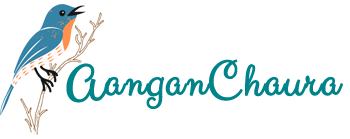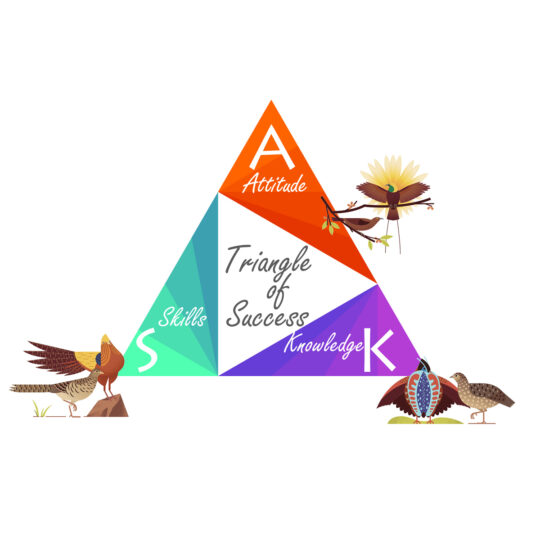
ASK Model
The ASK Model helps ensure a coherence between learning outcomes desired and achieved and feedback thereof. Any element of the teaching-learning process will have some element of more than one of these three focal points of the ASK model; hence any interaction aimed at attitude may also impact in some measures upon skills and knowledge and so on.
Our design of curriculum based on the ASK model involves taking a multi-disciplinary approach; with each part of a curriculum primarily targeting one specific attitude, skill or knowledge component but taking into cognizance its impact on the other two aspects as well.
Attitude
Physical well-being and Motor Development help healthy growth. Physical well-being includes good health & nutrition. Motor development focuses on fine and gross movement skills.
Social-emotional learning allows for healthy & productive collaboration with others and for a balanced state of body, mind, and spirit. It includes developing self-awareness, self-control and interpersonal skills. It helps self-discipline, emotion management and more.
Intercultural Understanding helps appreciate and respect others from different communities and cultures; and be open and flexible to social and cultural diversity. This helps build awareness of values, contexts attitudes & assumptions that affect perspectives and behaviors.
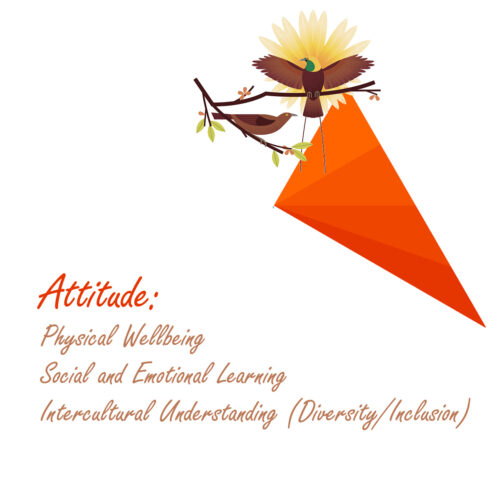
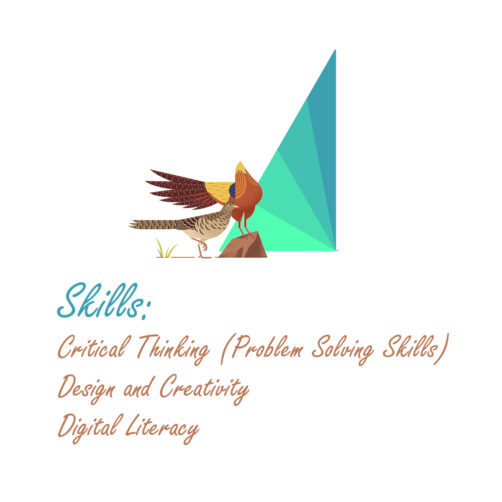
Skills
Problem Solving Skills help handle difficult or unexpected situations & challenges; helping make happier, more confident and more independent individuals. These help in daily life in relationship building & day-to-day decision making as well. Critical thinking is careful thinking directed to a goal; the analysis of facts to form a judgment.
Design and Creativity is the process to generate ideas, solutions or products that are novel and useful. It has an element of novelty and utility. It needn’t be entirely new and may include a derivation from different ideas.
Digital Literacy helps use information & communication technologies to find, evaluate, create, and clearly communicate information using digital platforms. It is very important in the modern day.
Knowledge
Literacy and Languages (English) are intimately related. Language skills include listening & speaking meaningfully & effectively. Literacy encompasses reading & writing effectively. This domain lays the foundation for further academic progress including in math, science & social science.
Numeracy (Mathematics) is an essential life skill. Numeracy helps in developing skills such as problem solving, understanding and using shapes and measurements and developing own spatial awareness
World around Us (Environment and Science) helps children think more scientifically and feeling comfortable asking questions about the world around them. It fosters children’s natural curiosity and engagement with their environment and help develop simple science skills (observing, classifying and predicting).
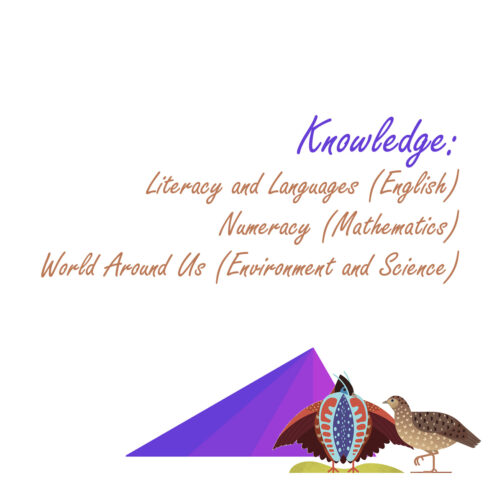

ASK Model
The ASK Model helps ensure a coherence between learning outcomes desired and achieved and feedback thereof. Any element of the teaching-learning process will have some element of more than one of these three focal points of the ASK model; hence any interaction aimed at attitude may also impact in some measures upon skills and knowledge and so on.
Our design of curriculum based on the ASK model involves taking a multi-disciplinary approach; with each part of a curriculum primarily targeting one specific attitude, skill or knowledge component but taking into cognizance its impact on the other two aspects as well.

Attitude
Physical well-being and Motor Development help healthy growth. Physical well-being includes good health & nutrition. Motor development focuses on fine and gross movement skills.
Social-emotional learning allows for healthy & productive collaboration with others and for a balanced state of body, mind, and spirit. It includes developing self-awareness, self-control and interpersonal skills. It helps self-discipline, emotion management and more.
Intercultural Understanding helps appreciate and respect others from different communities and cultures; and be open and flexible to social and cultural diversity. This helps build awareness of values, contexts attitudes & assumptions that affect perspectives and behaviors.

Skills
Problem Solving Skills help handle difficult or unexpected situations & challenges; helping make happier, more confident and more independent individuals. These help in daily life in relationship building & day-to-day decision making as well. Critical thinking is careful thinking directed to a goal; the analysis of facts to form a judgment.
Design and Creativity is the process to generate ideas, solutions or products that are novel and useful. It has an element of novelty and utility. It needn’t be entirely new and may include a derivation from different ideas.
Digital Literacy helps use information & communication technologies to find, evaluate, create, and clearly communicate information using digital platforms. It is very important in the modern day.

Knowledge
Literacy and Languages (English) are intimately related. Language skills include listening & speaking meaningfully & effectively. Literacy encompasses reading & writing effectively. This domain lays the foundation for further academic progress including in math, science & social science.
Numeracy (Mathematics) is an essential life skill. Numeracy helps in developing skills such as problem solving, understanding and using shapes and measurements and developing own spatial awareness
World around Us (Environment and Science) helps children think more scientifically and feeling comfortable asking questions about the world around them. It fosters children’s natural curiosity and engagement with their environment and help develop simple science skills (observing, classifying and predicting).
